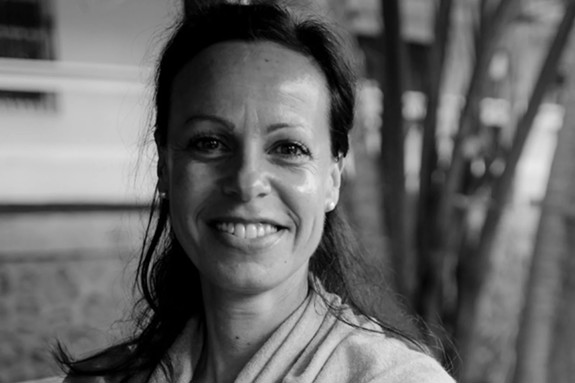Tragedy often plays out in the remotest of places, away from the international spotlight
Christine Cipolla joined the ICRC in 2005, after studying law and gaining some initial work experience. Today she is the Regional Director, Asia and the Pacific. “The ICRC was the obvious choice for me, because I’d always wanted to work closely with the victims of war.”

“The reality was harsh, and the lack of humanity, a shock. I just couldn’t accept the fact that some people – affluent, educated, born into wealthy families – could live lives of luxury and privilege, while others, less fortunate, were born into disaster. They suffer the consequences of war, their lives suddenly ripped apart, with parents losing all trace of their children, sometimes forever. This was to be my life, my vocation. If I couldn’t cure humanity’s failings, I would have to tend its wounds.
For 12 years, I was on the front-line. My missions took me to Asia, the Middle East and Africa. Tragedy often plays out in the remotest of places, away from the international spotlight. In places where, day by day, people die or are forced to leave everything behind, fleeing in search of shelter from the clash of arms. They have no choice but to leave. And all too often, they die. Quietly, without a fuss, in some place the world has forgotten. Some wars are silent.
I remember one particular mother very clearly. She was of limited means, but she’d wear her best clothes. She carried herself with dignity. Her bag contained food that she absolutely had to deliver to her son in prison. But every time she arrived at the prison gates, the guards sent her away. She was only a feeble woman, with no connections, no power. She just had to turn around and go home, her package of food intact and her heart broken. I hadn’t been able to enter that prison either. I couldn’t visit her son and I couldn’t tell her how he was. That upset me, terribly. It was awful to realise that all I could do as this woman poured out her sorrow, was to listen.
This woman’s strength and determination inspired me to act, to negotiate, to insist, to face refusal, to use all my stubbornness. Months later, we finally obtained access not just to this prison but to all the others too. Such suffering gives us wings and forces us to act, with indescribable strength.
And then there was the civil war. It went on for more than two decades. We were at the heart of the fighting for many months. We had to negotiate firmly to remain alongside all these families who had to flee time and time again, moving around as the fighting rolled back and forth. Troops on both sides of this symmetric conflict were locked in combat, with unprecedented levels of shelling and mortar fire. There were virtually no limits, no safeguards. Three of our colleagues were killed in duty. Others were injured. I tried everything. I spent my days and nights trying to protect civilians. I harassed the commanders to try and make them comply with international humanitarian law. But I could do nothing to prevent these tragedies. I couldn’t even give my fallen colleagues a decent burial. There was nowhere to bury their bodies with dignity. I think about them every day. They gave their all. They were exceptional colleagues.
Despite the tragedies, this war brought its share of successes, of lives saved. For many months, we evacuated the wounded by boat. Each trip lasted several hours, and as we sailed towards calmer regions, those journeys became oases of humanity. Faces wracked with pain. Mutilated bodies, barely surviving. Their limbs broken, torn or amputated. But they clung to life, to survival. For a while, they rediscovered their dignity, and we were there for them.
I will never forget the resilient women. From one instant to the next, they were forgotten, all hope and future gone. They depended on their menfolk. Traditionally, their role was to look after their families. When their husbands and their sons went off to fight, they were left with no income. And then their husbands, brothers and sons were killed, or taken prisoner. How were they to feed their families now? We spent hours talking to them, getting alongside them, maneuvering the cultural and linguistic barriers. Like them, we were women. Gradually, they opened up. The barriers came down and trust was established. We suggested micro-economic initiatives that could help restore their dignity. They had to get back on their feet; mothers are the thread that links the generations. These projects – which they designed – had an extraordinary impact on their lives. They started to hope again. Their children could go to school again. It was extraordinary. Today, years later, these projects are still going.
These experiences have marked me. By sharing them, I share a piece of my soul. It is the life of one who is a human, first, and a humanitarian, second. Examining oneself, listening, understanding, leaving one’s comfort zone and committing oneself to a humanitarian cause. This is my journey. And these are my experiences. They continue to motivate me in my daily life. Indeed, sacrifices are necessary and numerous, but they are amply rewarded by the richness of doing good for people affected by armed conflict. I have had the immense privilege of experiencing this, and of knowing some extraordinary colleagues. Day by day, in the most difficult parts of the world and in the most challenging contexts, they are our family, without whom nothing is possible. And I want to take this opportunity to thank them, every single one.
Was I able to save lives? Was I able to introduce some humanity, even if it was only a little? That is for the victims to judge.”
Christine Cipolla
ICRC
